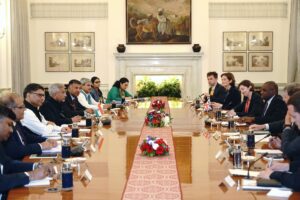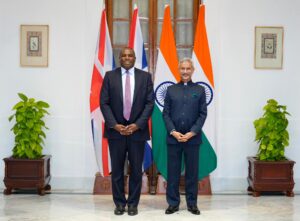A Bold Step Towards Technological Advancement
In a groundbreaking move, India and the United Kingdom have announced a new technology security initiative aimed at boosting economic growth and deepening collaboration. This agreement marks the first official visit to India by the newly appointed British Foreign Secretary, David Lammy. With a focus on crucial technologies such as AI, semiconductors, and critical minerals, this partnership is set to usher in a new era of innovation, jobs, and investment for both nations.
Strengthening Economic Ties: A New Era of Collaboration
A Vision for Mutual Growth
During his visit, Foreign Secretary David Lammy emphasized the potential for mutual growth through this partnership. The initiative aims to address future challenges collaboratively, particularly in areas like AI and critical minerals. Lammy’s optimism reflects the broader ambitions of both nations to enhance their economic landscapes.
The initiative is not just about technology; it encompasses a wide range of sectors including climate, trade, technology, and education. This multifaceted approach ensures that the partnership is comprehensive, addressing various aspects of bilateral relations and creating a robust framework for future cooperation.
The Role of Critical Technologies
At the heart of this initiative are critical technologies such as semiconductors and telecoms. These sectors are pivotal for both countries, given their strategic importance and potential for significant economic impact. By pooling resources and expertise, India and the UK can accelerate advancements in these areas, driving innovation and creating new opportunities for businesses and consumers alike.
The focus on semiconductors is particularly noteworthy, as global supply chain disruptions have highlighted the need for resilient and secure semiconductor production. This collaboration can help both countries reduce their dependence on external sources and develop a more self-sufficient supply chain.
Climate and Trade: Expanding the Partnership
In addition to technology, the partnership also emphasizes climate and trade cooperation. Climate change is a global challenge that requires concerted efforts from all nations. By working together, India and the UK can develop innovative solutions to mitigate the impacts of climate change, promote sustainable practices, and transition to cleaner energy sources.
Trade is another critical component of the partnership. The two countries have already made significant strides in trade relations, with a goal to double their trade volume by 2030. This initiative provides a solid foundation for further enhancing trade ties, creating new markets, and driving economic growth.

Defense and Security: A Strategic Alliance
Enhancing Indo-Pacific Security
The defense and security aspects of the partnership are equally significant. Both nations have agreed to boost their cooperation in the Indo-Pacific region, a strategic area that holds immense geopolitical importance. Strengthening defense ties ensures that both countries can address common security challenges, enhance regional stability, and safeguard their national interests.
This cooperation extends beyond traditional defense mechanisms to include cybersecurity and intelligence sharing. In an era where cyber threats are becoming increasingly sophisticated, such collaboration is crucial for protecting critical infrastructure and maintaining national security.
Also Read: https://newsreporto.com/tata-curvv-suv-launch-redefining-mid-suv-market/
Addressing Global Issues
The partnership also involves addressing global issues such as the Russia-Ukraine conflict. By aligning their foreign policies and working together on international platforms, India and the UK can contribute to global peace and stability. This collaborative approach reinforces their commitment to upholding international law and promoting a rules-based global order.
The Role of National Security Advisors
The involvement of key figures like Indian National Security Advisor Ajit Doval underscores the strategic importance of this partnership. Their discussions on various security issues highlight the depth of the collaboration and the shared commitment to addressing complex security challenges.
Political Dimensions: A New Diplomatic Chapter
Resetting Relations with Europe and the Global South
David Lammy’s visit to India is part of the UK government’s broader foreign policy priorities, which include resetting relations with Europe and engaging with the Global South. This approach reflects the UK’s desire to strengthen its diplomatic ties and play a more active role on the global stage.
The Labor Party’s victory in the recent UK elections has paved the way for a new diplomatic chapter. The new government is keen on resetting and relaunching UK-India relations, emphasizing the importance of strategic partnerships in driving economic and technological progress.
Free Trade Agreement: A Long-Awaited Milestone
A key aspect of the partnership is the pursuit of a free trade agreement (FTA) between India and the UK. The trade deal, which aims to double the bilateral trade volume to $100 billion by 2030, has been a long-standing goal for both nations. Although previous negotiations faced challenges, the new political landscape presents an opportunity to restart formal talks and achieve a breakthrough.
Prime Minister Narendra Modi has expressed his enthusiasm for the new technology security initiative and the prospects of a free trade agreement. His positive outlook reflects India’s commitment to strengthening economic ties with the UK and exploring new avenues for collaboration.
Overcoming Negotiation Hurdles
Despite the optimism, there are several hurdles to overcome in the FTA negotiations. Both countries have their own sets of priorities and concerns, which need to be addressed to reach a mutually beneficial agreement. The suspension of talks due to general elections in both nations highlights the complexities involved in such negotiations.
However, the renewed commitment from both sides and the strategic importance of the partnership provide a strong foundation for overcoming these challenges. By focusing on common interests and fostering a spirit of cooperation, India and the UK can achieve a landmark trade agreement that benefits both nations.

Educational and Cultural Exchanges: Building Bridges
Promoting Academic Collaboration
Education is another key area of focus in the India-UK partnership. Both countries recognize the importance of academic collaboration in driving innovation and economic growth. By promoting student exchanges, joint research projects, and academic partnerships, India and the UK can foster a culture of knowledge-sharing and mutual learning.
This collaboration extends to vocational training and skill development, ensuring that the workforce is equipped with the necessary skills to thrive in a rapidly evolving global economy. By investing in education, both nations can prepare their youth for the challenges of the future and create a more skilled and adaptable workforce.
Celebrating Cultural Ties
Cultural exchanges are equally important in strengthening bilateral relations. India and the UK share a rich cultural history, and promoting cultural ties can enhance mutual understanding and respect. By celebrating each other’s cultures through events, festivals, and artistic collaborations, both nations can build stronger people-to-people connections and foster a sense of camaraderie.
Leveraging Soft Power
Soft power plays a crucial role in diplomacy, and cultural exchanges are an effective way to enhance a nation’s soft power. By showcasing their cultural heritage and values, India and the UK can project a positive image on the global stage and strengthen their diplomatic influence.

Technological Innovation: Driving the Future
Advancements in AI and Semiconductors
Technological innovation is at the core of the India-UK partnership. Both nations are investing heavily in cutting-edge technologies like AI and semiconductors, which have the potential to revolutionize various industries and drive economic growth. By collaborating on research and development, India and the UK can accelerate technological advancements and create new opportunities for innovation.
AI, in particular, holds immense potential for transforming sectors such as healthcare, education, and manufacturing. By harnessing the power of AI, both nations can develop innovative solutions to complex problems, enhance productivity, and improve the quality of life for their citizens.
Telecom and Digital Infrastructure
Telecom and digital infrastructure are also key areas of focus in the partnership. As the world becomes increasingly connected, robust and secure telecom networks are essential for driving economic growth and ensuring national security. By collaborating on telecom infrastructure, India and the UK can enhance their digital capabilities and provide better connectivity for their citizens.
This collaboration includes developing 5G networks, which are critical for enabling advanced technologies like the Internet of Things (IoT) and smart cities. By investing in 5G infrastructure, both nations can position themselves at the forefront of the digital revolution and unlock new economic opportunities.
Innovation Hubs and Startups
The partnership also aims to promote innovation hubs and startups, which are key drivers of economic growth and technological advancement. By creating a conducive environment for startups and fostering innovation ecosystems, India and the UK can attract top talent, encourage entrepreneurship, and drive economic development.
Innovation hubs provide a platform for startups to collaborate, access funding, and scale their operations. By supporting these hubs, both nations can nurture a culture of innovation and create a vibrant startup ecosystem that drives economic growth and job creation.
A Promising Future of Collaboration
The new technology security initiative between India and the UK marks a significant milestone in the bilateral relations of both nations. With a focus on critical technologies, economic growth, defense and security, and educational and cultural exchanges, this partnership is poised to drive innovation, create new opportunities, and strengthen ties between the two countries.
As India and the UK continue to collaborate and build on this partnership, the future looks promising. By working together, both nations can address common challenges, unlock mutual growth, and create a brighter future for their citizens. The journey has just begun, and the possibilities are endless.


2 thoughts on “Pioneering Tech Partnership: India and UK’s New Initiative”